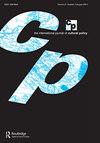The discursive construction of the role of public service broadcasting amid the rise of the Korean Wave
IF 1.6
3区 社会学
Q2 CULTURAL STUDIES
引用次数: 0
Abstract
ABSTRACTThis study examines how the sociocultural role of South Korean public broadcasting is affected by neoliberal cultural policies that situate the Korean Wave at the forefront. Drawing on Fairclough’s critical discourse analysis (CDA), this study examines 20 New Year’s addresses from two public broadcasters and two associated government institutions, identifying the discursive construction of public broadcasters’ roles during the tenures of five governments. In particular, the study illuminates how the neoliberal discursive construction of the media has increasingly reduced public broadcasters to mere economic entities, envisioning the media solely as a source of profit in a globalized media landscape. Providing empirical support, this research suggests that the social imaginary of the Korean Wave and its accompanying media policies have dwarfed the social roles of public broadcasters by linking culture to the nation’s supremacy and economic prosperity, thereby reinforcing neoliberal logic and beliefs against public values.KEYWORDS: PSBKorean waveneoliberalismcultural policysocial accountability Disclosure statementNo potential conflict of interest was reported by the author(s).Additional informationFundingThe author received no financial support for the research, authorship, and/or publication of this article.Notes on contributorsWoochul KimWoochul Kim conducts research on the Korean media and cultural industry at Simon Fraser University, with a particular emphasis on media production and the workforce within the Public Service Broadcasting (PSB) context, drawing from his extensive professional background as a producer, journalist and a lecturer in South Korea.韩流兴起中公共广播角色的话语建构
摘要本研究探讨以韩流为代表的新自由主义文化政策如何影响韩国公共广播的社会文化角色。利用费尔克劳的批评性话语分析(CDA),本研究分析了两家公共广播公司和两家相关政府机构的20篇新年致辞,以确定五届政府任期内公共广播公司角色的话语建构。特别是,该研究阐明了媒体的新自由主义话语建构如何日益将公共广播公司减少为纯粹的经济实体,将媒体仅仅视为全球化媒体格局中的利润来源。该研究提供了实证支持,表明韩流的社会想象及其伴随的媒体政策将文化与国家霸权和经济繁荣联系起来,从而强化了新自由主义逻辑和反对公共价值观的信仰,从而使公共广播公司的社会角色相形见绌。关键词:psb韩流自由主义文化政策社会责任披露声明作者未报告潜在的利益冲突。作者在研究、撰写和/或发表这篇文章时没有得到任何经济支持。woochul Kim在西蒙弗雷泽大学(Simon Fraser University)从事韩国媒体和文化产业的研究,特别侧重于公共服务广播(PSB)背景下的媒体制作和劳动力,他曾在韩国担任制片人、记者和讲师。
本文章由计算机程序翻译,如有差异,请以英文原文为准。
求助全文
约1分钟内获得全文
求助全文

 求助内容:
求助内容: 应助结果提醒方式:
应助结果提醒方式:


